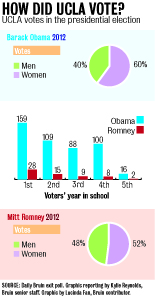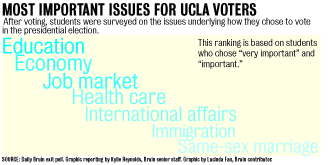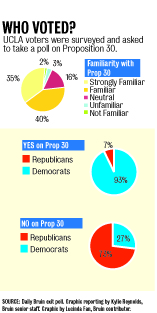

In line with state political trends, UCLA undergraduates overwhelmingly voted to re-elect President Barack Obama in Tuesday’s election, while they took a stronger stance than the rest of the state on Proposition 30, according to Daily Bruin exit poll results.
The Daily Bruin conducted exit polling at five voting sites on the Hill and the North Village to gauge how UCLA undergraduate students voted in this election.
Every fifth voter was anonymously polled and asked questions ranging from demographics to political affiliation. A total of 565 students were polled during the day.
About 87 percent of students supported Proposition 30 ““ the governor’s proposed tax measure ““ while early results showed that voting on the measure was too close to decide.
The proposition, if passed, would temporarily increase personal income tax and sales tax to fund K-12 education and community colleges. The revenues would free up state funds for other public institutions, such as the University of California.
Awareness about Proposition 30 increased on the UCLA campus in the month leading up to the election.
About 22 percent of undergraduate students said they were familiar with the tax measure at the start of the quarter, according to a Daily Bruin/UCLA Department of Statistics survey of 569 students conducted from Sept. 24 to Oct. 9.
That percentage increased to 75 percent among UCLA undergraduate students who voted Tuesday, according to Daily Bruin exit polling.
“A lot of people in the university have been trying to make people aware of the stakes of this election,” said political science and education professor Gary Orfield.
While Proposition 38’s passage would have nullified Proposition 30, exit polling showed that UCLA students were still voting for Proposition 38 at a slightly higher rate than the state. Proposition 38 was not voted in, according to the Associated Press.
About 33 percent of undergraduates at UCLA voted to pass Proposition 38, but only 27 percent of voters statewide voted in favor of it, according to the Secretary of State office as of press time.
“This is going to be directly affecting the quality of (students’) education and its cost,” Orfield said. “Students have an incredible intense interest in this (election).”
Students overwhelmingly voted to re-elect President Barack Obama, with 84 percent voting in support of the incumbent. About 11 percent voted for Republican candidate Mitt Romney.
These numbers were consistent with how students planned to vote about a month ago, according to the Daily Bruin/UCLA Department of Statistics survey.
“Among young voters, there is a slight leaning toward democrats,” said political science professor Thomas Schwartz. “For some reason, Obama magnified that.”
The percentage of students voting to re-elect President Obama also follows how UCLA voted in 2008, when 83 percent of people exit polled by the Daily Bruin voted for Obama, according to archives.
In choosing a presidential candidate, the economy, the job market and education ranked among the most important issues for students this year.
A majority of students chose Dianne Feinstein for Senate, who was also re-elected in the state for the fourth time, according to the Associated Press. About 77 percent of students voted for her at UCLA, which was higher than projected state results.
California propositions had mixed results on election night ““ some were decided by wide margins, while others hovered in close contests.
The ballot measure dealing with human and sex trafficking, Proposition 35, passed overwhelmingly, according to the Associated Press, with more than 80 percent of the vote as of press time.
Although Proposition 37, which would have required the labelling of genetically modified foods, was voted down statewide, UCLA students reported mixed results, with about 51 percent voting in favor of the measure.
As of press deadline, Proposition 34, which would ban the death penalty, was too close to predict and Proposition 36, which would modify the three strikes laws, passed, according to the Associated Press.
